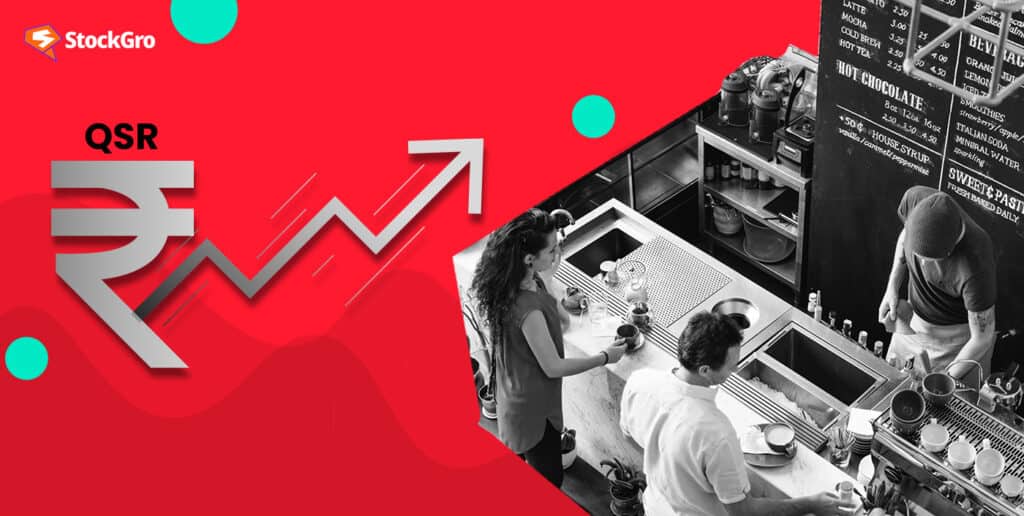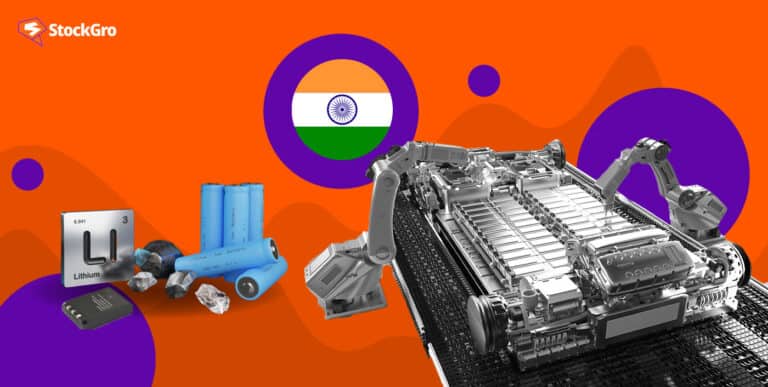
You can find quick service restaurants (QSRs) in almost every Indian city today. This multi-billion rupee industry kicked off with the entry of global brands like Domino’s and McDonald’s in the 1990s.
Today’s QSR market has expanded rapidly, with homegrown franchisee giants like Jubilant FoodWorks and Devyani International alongside international names.
This article looks at how the QSR sector started, where it stands now, what will drive its future growth, and which are the top QSR company stocks to consider.
Understanding the QSR industry
Quick-service restaurants have grown incredibly popular in all major towns and cities throughout the world, and just like fine dining, fast-casual and casual eating have created distinct categories based on their distinctive features.
The fast food and quick service restaurant industry was expected to reach $292.78 billion in 2023, up from $273.20 billion in 2022, representing a CAGR (compound annual growth rate) of 7.2%. Revenue from fast food and quick service restaurants will reach $371.47 billion in 2027, growing at a CAGR of 6.1%.
At its peak in the fiscal year of 2022, India’s quick-service restaurant industry was worth over 171.9 billion Indian rupees. By 2027, it is expected to reach more than 431 billion rupees.
The sector is seeing unparalleled development for a multitude of reasons, including but not limited to:
- Growing urbanisation,
- Proliferation of food delivery services,
- Number of working-age adults and millennials, and
- Increased disposable income across the nation.
Another major trend that is quickly becoming prominent in the QSR industry is technological development. Companies with a strong presence in the fast-food and quick-service restaurant industries are actively working on innovative solutions to improve their competitive position.
You may also like: Navigating the vibrant landscape of the Indian consumer market
Evolution of the QSR sector in India
In the mid-1990s, international chains like Domino’s and McDonald’s began operating in India. This was an important turning point for the country’s organised food services industry, which had previously been practically nonexistent.
The quick-service restaurant model appears to be the sweet spot between satisfying customers and making a profit. Over the years, it has become an essential component of the business.
Two franchisees in India control and run major food chains like KFC: Sapphire Foods and Devyani International. In FY22, Jubilant FoodWorks Limited’s income from operations was 4,331.1 million rupees. A year-over-year increase of 85.9% was recorded in net profit for FY22.
On the other hand, under a contract with McDonald’s Corporation USA, Westlife Foodworld Ltd. runs quick-service restaurants (QSRs) in India via its affiliate, Hardcastle Restaurants Pvt. Ltd. (HRPL).
Since its establishment in 1996, HRPL has served as a franchisee in the area. As of June 2023, HRPL had 361 McDonald’s outlets in 56 cities, serving over 200 million customers per year.
Today’s quick service restaurant market in India
These days, you can find many QSR businesses just about anywhere. Many of the world’s most well-known brands, including KFC and McDonald’s, have their roots in a group of companies that began decades ago. As time has passed, this market mindset has shifted, particularly in India.
As fast food chains are seeing rapid growth in tier II and tier III cities, these demographics represent a massive opportunity for quick-service restaurant brands. A growing number of consumers prefer purchasing branded goods over generic ones. With all these factors in play, it’s clear that the quick-service restaurant industry is booming, with tier II and tier III towns alone seeing revenue of $134.3 million.
An increase in demand and a boost in penetration due to fast store expansion is expected to push the industry in India to a 20-25 per cent growth rate for the current fiscal year.
Increasing levels of QSR penetration, a change from the unorganised to the organised segment favouring branded QSR players due to hygiene and efficiency, etc., will all contribute to increased revenue in the long run.
Much of the unorganised sector was occupied by conventional fast food models such as roadside restaurant chains, Dhabas, and food stalls. On the other hand, global restaurant chains like Domino’s, McDonald’s, and Pizza Hut control the organised fast-food market in India.
Also Read: Cracking the quick commerce code: Zepto’s journey to a $1.4 billion unicorn
Future of the QSR brands in India
From what we can see so far, QSR has gone a long way and provides numerous advantages to the general public. As a result of the following reasons, the sector will boom in the years to come.
The growing population of youth
More than half of India’s population is under the age of 25, and over two-thirds are under the age of 35. The expansion of the quick-service restaurant industry is supported by the fact that people in this age bracket make up the perfect target market for your brand.
These quick-service restaurants capitalise on people’s expectations that their food will be delivered promptly when they dine out.
Rise in national income per capita
Rapid economic growth in India, at a CAGR of 9.8 per cent, drives consumer spending in the nation. Because of this, Indians now eat outside on average six times a month, which is a significant increase. As a result of rising disposable income, which boosts accessibility to the internet, this figure will continue to rise.
Internet access in urban centres
More people than ever before can get online now. At the same time, the online ordering system is constantly being improved. This might boost sales in Tier II and III cities in the future.
Also Read: Overview of the e-commerce industry in India
Top QSR stocks in India
Below are some of the top QSR companies ranked by market capitalisation as of March 5, 2024.
| Company | Market cap (₹ cr.) | Total revenue in FY2023 (₹ cr.) | Share price % returns (1Y) as of March 5, 2024 |
| Jubilant FoodWorks | 30171.42 | 5,208.66 | 3.6 |
| Devyani International | 18642.58 | 3,030.31 | 1.68 |
| Westlife Foodworld | 12400.04 | 2,298.52 | 18.5 |
| Sapphire Foods | 9536.28 | 2,296.67 | 20.04 |
Conclusion
With an expanding young population, rising incomes, and shifting consumer tastes, India’s QSR industry exhibits immense growth potential. While international giants continue to expand, homegrown players have also emerged as formidable competitors.
In the future, the use of technology for smoother deliveries and millennials’ preference for better dining experiences will shape the industry.

